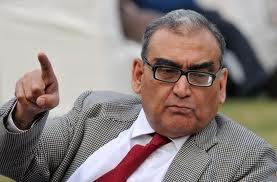 New Delhi, December 19: True to form, Press Council Chairman Justice Markandey Katju slammed the horrific Delhi gang rape but cautioned people against creating a hype around a single incident while unemployment, farmers' suicide and lack of healthcare remain pressing problems that need to be tackled immediately.
New Delhi, December 19: True to form, Press Council Chairman Justice Markandey Katju slammed the horrific Delhi gang rape but cautioned people against creating a hype around a single incident while unemployment, farmers' suicide and lack of healthcare remain pressing problems that need to be tackled immediately.
Katju, known for his astute and often acerbic take on current events, also stated that such an incident in rural India would not have resulted in the condemnation in media and Parliament that the Delhi rape has generated.
"I strongly condemn this crime, and am of the opinion that those who are found guilty by a court of law should be given harsh punishment. At the same time, I would like to know whether the same hue and cry which has been raised about it in the media and in Parliament would have been raised had this incident happened in some other part of India, particularly in rural India.
"I am sure it would not. But surely Delhi is not the whole of India," he said in a blog post. Katju went on to cite the case of farmers' suicide in Vidharba.
"There has been hardly any hue and cry to a similar extent about the 250,000 farmers suicide in Vidharbha, Andhra Pradesh and elsewhere over the last 10-15 years (an average of 47 farmers suicide per day, which is still continuing) which is a world record of farmers suicide," he said.
"I am not trying to justify rape but I only request people to maintain a balance and not hype the Delhi gangrape incident as if it is the only problem in the country. Section 376 Indian Penal Code already provides for a maximum of life sentence for rape, and I see no reason why capital punishment should also be provided for it," he said.
According to Katju, India needs to give equal importance to malnourished children, massive unemployment in India, the almost total lack of healthcare, education in India and skyrocketing prices.





Comments
Add new comment